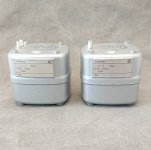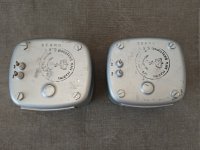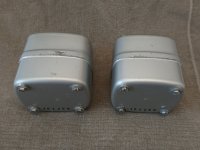I just got my hands on a pair of chokes. I wonder if they are any good for CLC-filtering in tube pre stage? Havent used oil filled chokes before. Or other handy alternatives? See pictures...
Attachments
Last edited:
Agree with Jon , this type has its British equivalent which I have several mains transformer versions dating back to WW2 .
Used by governments for stability /long term use /use in adverse climate conditions etc.
You could tell a good quality ( and expensive ) valve (tube ) radio in the UK by the fitting of a choke instead of a "money saver " big black/thick /noisy carbon resistor.
Used by governments for stability /long term use /use in adverse climate conditions etc.
You could tell a good quality ( and expensive ) valve (tube ) radio in the UK by the fitting of a choke instead of a "money saver " big black/thick /noisy carbon resistor.
Is the oil really that nasty? We had to replace a massive mains transformer the size of a car in work becuase the oil inside contained PCB's, and thus was a risk to the environment if it should leak. Seemed a bit daft to me when the thing was housed in a building away from the elements.
A PSU choke (not a "shoke"!) is theoretical a good part and is better than a resistor.
In practice, this looks much different. The choke should be only one in a PSU, because they can make problems with more than one. And they are not as perfect as the theory says.
Most of the great amp designs which used chokes therefore had only one choke in the PSU, not a series of chokes. With resistors, there are no problems with adding series elements. But beware doing this with chokes. Theory never shows all effects of the true reality. And an old choke in oil, no one should use this anymore. I had my share with old oil caps that became leaky. This oil may be hazardous and a poison. In my amps, I would never use that poison stuff.
In practice, this looks much different. The choke should be only one in a PSU, because they can make problems with more than one. And they are not as perfect as the theory says.
Most of the great amp designs which used chokes therefore had only one choke in the PSU, not a series of chokes. With resistors, there are no problems with adding series elements. But beware doing this with chokes. Theory never shows all effects of the true reality. And an old choke in oil, no one should use this anymore. I had my share with old oil caps that became leaky. This oil may be hazardous and a poison. In my amps, I would never use that poison stuff.
Thanks for all the feedback. I have used chokes in several PSUs in tubeamps. I wonder if those are better or worse than common chokes without oil filled?
Those chokes are NOS and just long storage have made the patina.
Those chokes are NOS and just long storage have made the patina.
A choke is a choke.
Similar specifications will yeild similar results. Oil filled capacitors are as bad. Highly toxic.
The insulating oil used within transformers proves to be a health hazard to almost everything including plant life.
They must be disposed of in the correct manner using hazardous protective equipment.
Similar specifications will yeild similar results. Oil filled capacitors are as bad. Highly toxic.
The insulating oil used within transformers proves to be a health hazard to almost everything including plant life.
They must be disposed of in the correct manner using hazardous protective equipment.
Ok thanks. What were the specific reason for using them in the first place with oil inside if its as good without oil?
Many people won't realize that PCBs are the class of chemicals including dioxin.Is the oil really that nasty? We had to replace a massive mains transformer the size of a car in work becuase the oil inside contained PCB's, and thus was a risk to the environment if it should leak. Seemed a bit daft to me when the thing was housed in a building away from the elements.
Tolerable daily intake of dioxins/PCBs is defined in pg/kg (parts per quadrillion, or parts per 10^15, which is down at the "way less than one molecule per body cell" level if you do the maths.
Yes the oil is really that nasty if its from the period before PCBs were controlled.
Oil immersed transformers/chokes are used to-
1= help with keeping the transformer cool.
2=the special type of paper used for soaking up the oil with no loss of mechanical stability providing spacing between the winding's as a dielectric .
3= Oil is a better insulator than air therefore clearances can be reduced
providing more compactness .
4=The oil fills the air gaps and paper improving paper insulation.
Mark is right about PCB,s -dangerous !
Mineral oil is now used.
1= help with keeping the transformer cool.
2=the special type of paper used for soaking up the oil with no loss of mechanical stability providing spacing between the winding's as a dielectric .
3= Oil is a better insulator than air therefore clearances can be reduced
providing more compactness .
4=The oil fills the air gaps and paper improving paper insulation.
Mark is right about PCB,s -dangerous !
Mineral oil is now used.
At 210 ohm DCR, the chokes may well have gotten quite warm in use, and the oil would transfer heat out of the windings. Just a guess.
I recommend you spend the time and do some testing of how the inductance varies with dc current and AC voltage, and do an insulation resistance measurement at 1kVdc. That would then provide confidence on how well and safe those parts can be used in upcoming projects. Vintage chokes like that could be designed for CLC or LC filtering, and the rating plate doesn't identify that or the maximum dc current capability.
Inductance testing can be DIY:
https://www.dalmura.com.au/static/Choke%20measurement.pdf
Inductance testing can be DIY:
https://www.dalmura.com.au/static/Choke%20measurement.pdf
It may be worth making sure the chokes still have oil. Seals can fail and slowly let the oil out. Maybe carefully weigh both and make sure they weigh the same.
Sort of fun to see something with oil filled capacitors or chokes and notice dried oil under the terminals.
Sort of fun to see something with oil filled capacitors or chokes and notice dried oil under the terminals.
Yep. The fact that it says "60Hz"on them may mean they are not intended for DC. How big are they physically?I recommend you spend the time and do some testing of how the inductance varies with dc current and AC voltage, and do an insulation resistance measurement at 1kVdc. That would then provide confidence on how well and safe those parts can be used in upcoming projects. Vintage chokes like that could be designed for CLC or LC filtering, and the rating plate doesn't identify that or the maximum dc current capability.
Inductance testing can be DIY:
https://www.dalmura.com.au/static/Choke%20measurement.pdf
- Home
- Design & Build
- Parts
- Oil filled chokes 12,5H



 Thread title fixed
Thread title fixed